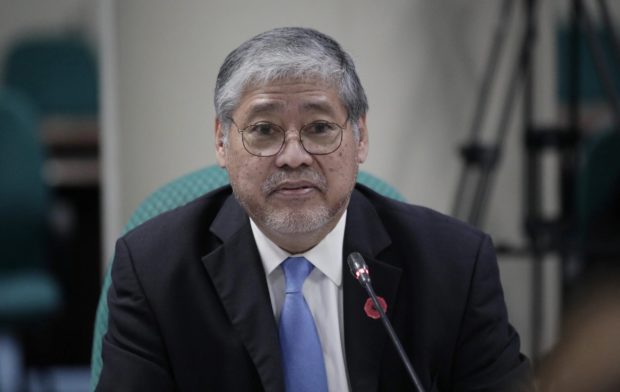
Department of Foreign Affairs Secretary Enrique Manalo. (File photo from the Senate Public Relations and Information Bureau)
MANILA, Philippines — The Philippines and Japan and their main security ally, the United States, formed a trilateral front against Chinese incursions in the South China Sea following a meeting on the sidelines of the United Nations General Assembly in New York last week.
“The Philippines, as you are aware, continues to face challenges with sovereign rights and jurisdiction in the West Philippine Sea or South China Sea,” Philippine Foreign Secretary Enrique Manalo said in his opening remarks during the Sept. 19 meeting with Japanese Foreign Minister Kamikawa Yoko and US Secretary of State Anthony Blinken.
Manalo said that despite the 2016 arbitral award that upheld Philippine sovereign rights over its 370-kilometer exclusive economic zone (EEZ), the Chinese continued to encroach into these waters and harass Filipino vessels.
He said that in addition to the use of water cannons and military-grade lasers against Philippine vessels by the China Coast Guard (CCG), his country also suffered economically due to “challenges to our ability to benefit from the resources in our exclusive economic zone.”
The three allies made a commitment to face conflicts with China as a team of three, or trilaterally, instead of just bilaterally. In the East China Sea, Chinese vessels are also conducting illegal activities within Japan’s EEZ.
“The three countries will continue to call out behavior that is inconsistent with international law, including the [People’s Republic of China’s] recent actions near Second Thomas [Ayungin] Shoal that interfered with the Philippines’ lawful exercise of high seas freedom of navigation,” Department of State spokesperson Matthew Miller said in a statement on Friday.
Manalo also pointed to the ongoing Philippine-US partnership in modernizing the Armed Forces of the Philippines and the addition this year of four new sites that would host US forces and military equipment under the Enhanced Defense Cooperation Agreement (Edca).
While no actual trilateral patrols have been initiated in the South China Sea, the Philippines, United States and Japan held joint sails in the West Philippine Sea. Patrols are conducted to monitor the country’s defenses while sails are a show of unity.
In August, the United States, Japan, and Australia conducted joint patrols in the waterway. They were done while Filipinos and Australians held naval drills called “Alon.”
The United States and the Philippines are planning to conduct joint patrols in the West Philippine Sea along with like-minded countries, such as Australia and Japan, but no specific date has been announced yet.
In a news forum last week, AFP spokesperson Col. Medel Aguilar said Malaysia, France, India, Canada and Singapore were also keen on the idea.
Teodoro: ‘Hypocritical’
In Manila on Saturday, Defense Secretary Gilberto Teodoro Jr. shot back at China for claiming that the decrepit BRP Sierra Madre, a Philippine military outpost in the West Philippine Sea, had caused “irrevocable harm” to Ayungin Shoal, saying that Beijing was being “hypocritical.”
“Talk about the pot calling the kettle black!” Teodoro said in a statement. “China continues to damage the WPS by its illegal reclamation activities in the SCS and it was found to be a violator of international law in the 2016 arbitral award when such activities damaged the marine environment.”
“Disingenuous propaganda lines such as this only serve to expose China’s insincerity and will only heighten the mistrust by the Filipino people and the rest of the world of the Chinese government,” he added.
‘No factual basis’
China earlier denied reports by the AFP and the Philippine Coast Guard that Chinese maritime militia vessels were responsible for the massive destruction of corals at Rozul (Iroquois) Reef and Escoda (Sabina) Shoal, which are within the Philippines’ EEZ.
The Office of the Solicitor General on Thursday said it was studying whether to file a new complaint against China in an international tribunal over the destruction of the coral reefs.
Beijing said the accusations had “no factual basis,” and urged Manila “to stop creating political drama from fiction.”
Chinese foreign ministry spokesperson Mao Ning said that “if the Philippines truly cares about the ecological environment of the South China Sea,” it should tow away the Sierra Madre “as soon as possible, stop it from discharging polluted water into the ocean and not let the rusting warship bring irrevocable harm to the ocean.”
The military deliberately grounded the Sierra Madre at Ayungin in 1999 to mark the country’s claim to the shoal and to serve as an outpost.

